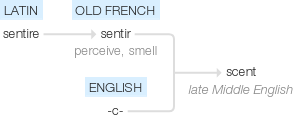Scent
late Middle English (denoting the sense of smell): from Old French sentir ‘perceive, smell’, from Latin sentire . The addition of -c- (in the 17th century) is unexplained.
wiktionary
From c.1400, from Middle English sent(noun) and senten(verb), from Old French sentir(“to feel, perceive, smell”), from Old French sentire "to feel, perceive, sense", from Latin sentīre, present active infinitive of sentiō. Ultimately from Proto-Indo-European *sent-(“to feel”), and thus related to Dutch zin(“sense, meaning”), German Sinn(“sense”), Low German Sinn(“sense”), Luxembourgish Sënn(“sense, perception”), Saterland Frisian Sin(“sense”), West Frisian sin(“sense”). The -c- appeared in the 17th century, possibly by influence of ascent, descent, etc., or by influence of science.
etymonline
scent (v.)
late 14c., sent "to find the scent of," from Old French sentir "to feel, smell, touch, taste; realize, perceive; make love to," from Latin sentire " to feel, perceive, sense, discern, hear, see" (see sense (n.)).
Originally a hunting term. The -c- appeared 17c., perhaps by influence of ascent, descent, etc., or by influence of science. This was a tendency in early Modern English, also in scythe and for a time threatening to make scite and scituate. Figurative use from 1550s. Transitive sense "impregnate with an odor, perfume" is from 1690s. Related: Scented; scenting.
scent (n.)
late 14c., "scent, smell, what can be smelled" (as a means of pursuit by a hound), from scent (v.). Almost always applied to agreeable odors.
